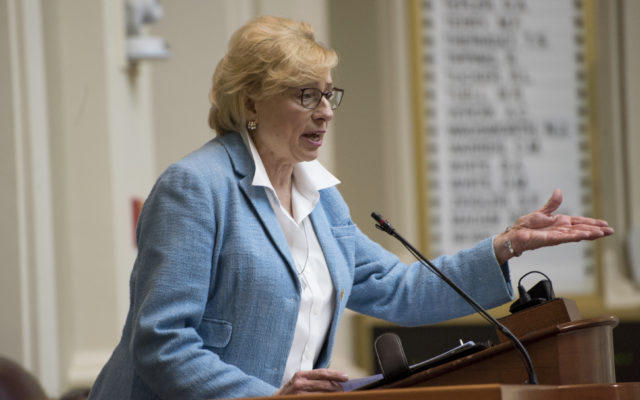
Maine virus response bill allows town meeting delays, gives Mills power over June primary
AUGUSTA — Before adjourning on Tuesday because of the coronavirus, the Maine Legislature passed a package of bills letting municipalities and schools operate on current budgets through January and giving Gov. Janet Mills wide authority over the June primaries.
The bills, which were passed without debate in a marathon session, included an omnibus package giving Mills temporary powers to waive restrictions and deadlines related to municipal government. It complemented a $73 million spending package brokered this weekend, much of which is aimed at combating the spread of the virus.
It includes $1 million for the Maine Center for Disease Control and Prevention to expand coronavirus testing at a state lab and to hire more epidemiologists and nurses to respond to the pandemic. Lawmakers also set up an $11 million reserve fund specific to the virus, which led legislative leaders to choose to adjourn nearly a month before a scheduled adjournment date.
The Democratic governor is expected to sign the bills that were passed by the Legislature on Tuesday in a marathon session with the State House closed to everyone but lawmakers, staff and reporters amid the outbreak. In addresses to the chambers late in the day, Mills said the state is going through uncertain times, but encouraged lawmakers to take heart.
“We will get through this together, for we are all family,” Mills said.

AUGUSTA, Maine — January 21, 2020 — Gov. Janet Mills delivers her State of the State address in Augusta on Jan. 21. The governor will be releasing a series of provisions allowing towns and schools to operate on their existing budgets in the event town meetings are delayed due to the coronavirus. (Natalie Williams | BDN)
One of the most significant provisions in the omnibus bill allows schools and towns to spend in line with their current budget through January if town or budget meetings are delayed because of the virus. Town meetings are usually held in March. Spending typically must be approved by voters. That provision would end 30 days after the health emergency ends or Jan. 1, 2021.
It also gives Mills the ability to take “any reasonable administrative actions” to facilitate voting in the June primaries. That could include expanding the use of absentee voting to keep voters away from polling locations if the outbreak persists. Costs of such measures were expected to be absorbed by Secretary of State Matt Dunlap’s office.
Municipalities will also be allowed to hold remote public meetings until 30 days after the emergency ends provided they follow state public notification laws, while the Maine Department of Education will be allowed to waive certain attendance requirements to allow students of closed schools to graduate. The effective date of a statewide plastic bag ban was delayed from April 2020 to January 2021 as part of the coronavirus response.
Cities and towns will be allowed to extend registrations and licenses that will expire for 30 days after the emergency ends and would allow for online registrations regardless of whether the municipality participates in the online system. Dunlap’s office closed motor vehicle bureaus to the public this week.
Several health care bills are also expected to pass as part of the agreements between Democratic and Republican lawmakers, including a Mills-backed bill to create a state-run health insurance exchange and a package of bills from Democratic leaders including putting a cap out-of-pocket insulin costs, preventing surprise bills for emergency medical services, requiring health care providers to give itemized bills and disclose average service costs and creating an advisory commission within the Legislature meant to study health care costs.
The Legislature’s final day came in the wake of Mills declaring a civil emergency in the state as the virus spreads. She has recommended limiting gatherings of more than 50 people and recommended public schools move to remote instruction. Any bills that weren’t dealt with Tuesday will be held at least until later this year, when the Legislature plans to return.